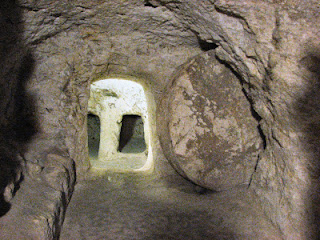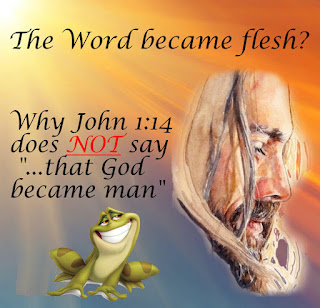The Restitution: Biblical Proof that Jesus is NOT God - (and signs of a 21st Century Reformation?)
A review of The Restitution: Biblical Proof that Jesus is NOT God by Kermit Zarley*
_ _ _ _ _
Anyone who thinks that the Bible claims that God
is a Trinity, or that the Bible claims that Jesus Christ is God, should read
this book. The Restitution: Biblical Proof that Jesus is NOT God is a comprehensive study of
biblical Christology. What does the Bible say about who Christ
(Messiah) is? For some 1700 years Christian churches have answered that
question by saying that Jesus is God, or a God-Man. Former Trinitarian Zarley challenges that
answer. He maintains that the biblical view is not “God is
Christ”, but “God in Christ”. That is, the One God of the Bible,
Yahweh, worked in and through His human Messiah, Jesus, to reveal Himself to
mankind (John 1:18, Heb. 1:1), and to reconcile the world to Himself (2 Cor.
5:19).
In the first part of the book Zarley reviews the
historical development of deity-of-Christ and Trinitarian theology. The
standard church narrative runs something like this: “Beginning in New Testament
times and then for hundreds of years Christians believed that Jesus is God
and that God is a Trinity. Only in the 3-4th centuries did people
begin suggesting that Jesus isn’t God, and the church rightly condemned such
heretical views”. With careful research Zarley
shows that narrative to be false.
The main part of the book is a step by step,
well-researched study of biblical Christology. First is “Messianism in the Old
Testament” where Zarley examines traditional Christianity’s claims of finding
evidence for the Trinity or deity of Messiah in the Old Testament: the plural “Elohim”,
appearances of the angel of the Lord acclaimed as pre-incarnate appearances of
Jesus, and passages like Genesis 1:26, Isaiah 7:14, 9:6 are among those considered.
Then Christology in the New Testament, beginning
with the synoptic Gospels, Matthew, Mark and Luke. How do they present Jesus? What
is the real answer to Jesus’ question: “Who do you say that I am?“ (Matt.
16:15, Mark 8:29, Luke 9:20). “Problem passages” which traditional Christianity
has claimed show the deity of Christ or the Trinity, like Matthew 28:19, are
investigated.
A major part of The Restitution is
dedicated to a study of the Christology of the Gospel of John, since this New
Testament book is considered by traditional Christianity to most clearly show
the deity of Jesus. Therefore, Zarley considers his own analysis of John the
most significant part of his book. John’s prologue (1:1-18), statements like “making himself
equal with God” (5:19), “before Abraham was, I am” (8:58), “I and the Father
are one” (10:30), “my Lord and my God” (20:28 ) and other passages including a
number from John’s epistles are examined and shown to be understood better as
“God in Christ” and not “God is Christ”. Consistent
with the Synoptic Gospels, John presents Jesus as God the Father’s chief agent
or representative, through whom God the Father is working.
John 1:1-18, John’s Prologue receives considerable attention. I agree to a great degree with Zarley’s presentation Christology in the Gospel of John. John's Christology is not "incarnation" (that one member of a multi-person godhead became flesh) but rather "agency", that the man Jesus Christ is God's authorized and empowered agent. Jesus represents God. The only God in the Gospel of John, the Father, "dwells in" Jesus (John 14:8-20, etc.).
However, I don’t agree that appealing to “wisdom Christology” is the best way to understand John’s Prologue. Rather, I understand John’s Prologue to be introducing a new beginning/creation which God brings about through the man Jesus Christ, who is metaphorically called the Word in John 1:1. Still, Zarley shows the inconsistencies and failures of the “deity of Christ” (Trinitarian) interpretation of John 1.
The Restitution continues with a thorough
analysis and helpful insights concerning Paul’s Christology, then of the Book of Hebrews, of Peter and his
epistles, and finally of the Apocalypse (Book of Revelation).
This reviewer agrees to a great degree with
Zarley’s presentation of biblical Christology. My only real criticism concerns
the book’s physical format. The edition I have has a spiral binding with a calendar
triangular flip format. I found the format cumbersome and sometimes confusing.
After a few pages of reading I decided it would be easier for me to read the
book without the triangular backing. I understand there are plans to make the
book available in an e-format. That would be a positive, but this book also
needs to be made available in a traditional book format.
On the one hand the book is a scholarly work,
well-documented with hundreds of footnotes. On the other hand, it is very
readable and accessible to the lay reader. It may be a bit of a daunting read
from cover to cover (546 pages not including bibliography) but I found the
reading only tedious in a couple places. The book will serve well as a
reference for future study. Even if they don’t agree with Zarley’s claims,
Bible college and seminary students, teachers, pastors and lay persons should
read this book so they can better understand what they do believe.
Along with a growing number of other books,
podcasts, internet and social media channels, the publication of The
Restitution: Biblical Proof that Jesus is NOT God is a needed appraisal of the Church’s long-standing
ignorance and suppression of knowledge of Yahweh the God of Israel and His
Messiah, Jesus. Zarley’s book plays a part in what some have called a 21st
Century Reformation.
*Kermit Zarley is a retired
professional golfer and Christian author. In
1965 he co-founded the PGA Tour Bible Study group which continues to
this day. The Restitution was originally published in 2008 under the pseudonym Servetus the Evangelical as The Restitution of Jesus Christ.
The book is available here on Amazon.
The book is available here on Amazon.


Comments
Zarley surprised me with his careful, methodical analysis. I kept thinking, "This guy was a professional golfer? He writes more like a biblical scholar!" (Which shows, I guess, that the two aren't mutually exclusive!)
There is a wealth of material in his volume that deserves to be considered by anyone interested in better knowing Messiah Jesus.